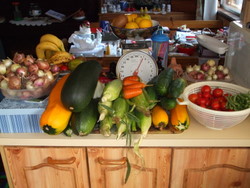“I teach self reliance, the world’s most subversive practice. I teach people how to grow their own food, which is shockingly subversive. Yes, it’s seditious. But it’s peaceful sedition” - Bill Mollison
Main stream agriculture consumes vast amounts of water and chemicals which are mostly derived from oil, results in the loss of topsoil and consumes large amounts of fuel to transport its products. All this for vegetables designed to be grown using fertilisers and pesticides and to be transported – flavour and nutrition come way down on the list of desirables (if they appear at all). Agriculture contributes around 16% of Australia’s greenhouse gas emissions, consumes 70% of our fresh water and on average our current system consumes three calories of energy to produce one calorie of edible food. As most of the energy required to produce our food is obtained from fossil fuels it is easy see that the system that most of us get our food from just isn’t sustainable.
In contrast, growing your own veggies in your back yard, front yard, roof, windowsill or wherever, for the work that they require, provide many benefits for you, your family and the environment –
- Flavour – you can choose from a wide variety of produce that is not available in the shops, particularly if you are prepared to start your veggies from seed.
- Nutrition – Vegetables start to lose vitamins within a very short time of being picked. By growing your own you can be eating steamed or stir-fried vegetables within 30 minutes or less of their being picked.
- Food Miles – likewise you know that the produce you are eating has not been trucked or flown from 1000 kilometres away, consuming fossil fuels and releasing carbon dioxide in the process.
- Water – Vegetables grown intensively using the principles outlined in this book use much less water, some or all of which can in many cases be sustainably harvested rainwater. Water harvested on the site also means a reduction in the energy cost to purify and transport reticulated water which would otherwise be used for irrigation.
- Fertiliser, Pesticides and Herbicides – by using organic and permaculture principles, vegetables can be produced without recourse to chemicals. Agricultural chemicals result in the pollution of ground water, the eutrophication of surface waters, illness and allergies in farm workers, and indirectly, loss of topsoil. The jury is still open on the effects on the human body of long term exposure to chemical residues in foods.
- Soil Degradation – Again, by gardening organically, working with the soil organisms, the soil is built up over time, not degraded.
- Cost and Availability – Growing your own, particularly when growing from seed, saves you money. If you time it right you can also be eating your own produce when it is expensive in the shops. This not only saves you money but is intensely satisfying.
- Packaging – food packaging is a significant contributor to our waste streams but is entirely eliminated when all you need to do to get your fruit and veggies is to walk into the back yard.
- Health – improved health not just due to the improvement in nutrition brought about by consuming home grown food but also the fresh air and healthy exercise outdoors.
- Helping your Kids Reconnect with their Food – do you really want your kids to think that food only comes from Woollies or Coles in plastic packages? Growing your own food will help them to understand where food comes from, how it is produced and how the seasons really affect what we eat.
- Garden Biodiversity – growing things other than grass and ornamentals will entice new insects, birds and other wildlife into your little corner of the world.
There are also some other intangibles you can pick up along the way such as the satisfaction that comes when you cook your first meal based solely on your own produce, seeing your kids connect with the idea that food doesn’t come from a supermarket or factory – you grow it, and providing for your family’s needs from scratch in a personal way, not just by making money and then using the money to buy what you need. There is also a good deal of fresh air and good exercise to be gotten from veggie growing and it is one of the best stress relieving activities I know of!
While a lot of the reasons for growing your own are about helping the planet, there are an equal number of reasons for growing your own that help you in a direct tangible way, so if any of the foregoing has talked you into starting a veggie garden, let’s get started!


